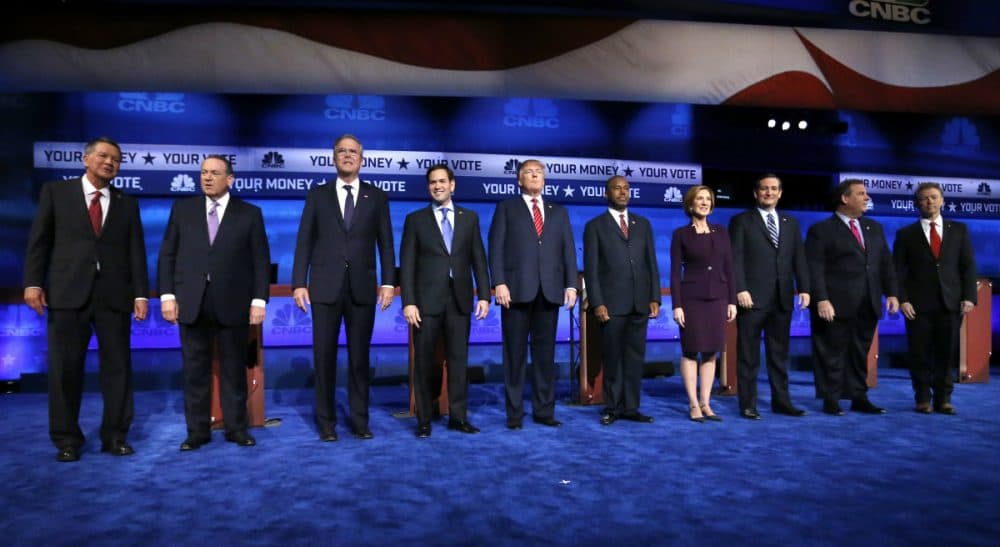Advertisement
In Third GOP Presidential Debate, A Perplexing Anti-Government Theme

The anti-government, anti-public spending rhetoric in this year’s Republican debates has reached new heights, raising the question of why these candidates want to be in office at all.
...judging from their comments and tone, these candidates don’t want to save the U.S. government, but strafe it, as bombardier-in-chief.
Before this week’s Republican debate began, I began searching for a theme, an angle that hadn’t yet been taken in this already endless political season. Maybe I’d borrow from Facebook games and characterize the candidates by what city they personify (Gotham in its darkest days); what book they sound like (Journey to the Center of the Earth); which of the Seven Dwarves they most resemble (almost exclusively Grumpy, but with a Dopey or two); which of the Three Stooges (all Moe’s); even which of The Beatles (though really, none of them is “the cute one”). Perhaps I’d focus on the price of advertising — $250,000 for a 30-second spot – and whether Donald Trump and Ben Carson were intrepid underdogs for the little guy (as The Donald subsequently claimed) for demanding that the debate be a mere two hours, thereby depriving CNBC of ill-gotten revenues.
Instead, I decided just to watch it with my mind pried as open as I could muster, to listen not for the potential gotchas, but for what of substance these candidates might actually say. And to my surprise, I heard occasional statements of fact and references to policy.
But by the end of the evening, I was baffled. The anti-government vitriol espoused by every candidate — except, perhaps, John Kasich — reminded me of the oft-quoted U.S. Major who allegedly said of a just-bombed Vietnamese village (and its many civilian casualties), “It became necessary to destroy the town to save it.” Only, judging from their comments and tone, these candidates don’t want to save the U.S. government, but strafe it, as bombardier-in-chief.
In his first inaugural speech in 1980, Ronald Reagan said, "Government is not the solution to our problem; government is the problem." That’s been the mantra of the Republican party ever since, and, as with so many of their beliefs, what originated as a principle has evolved into a demagogic rallying cry for its candidates ever since.
“You’re being robbed! The government lies to you and steals from you,” Gov. Christie thundered early and often. “Who has actually taken on Washington?” (and Planned Parenthood), demanded Ted Cruz. “I will cut this government down to size …” pledged Carly Fiorina. “We have a government and leaders in government that are completely out of touch,” declared Marco Rubio. “I want a government so small that I can barely see it,” Rand Paul muttered.
These candidates condemned more than taxes and spending. Paul attributed income inequality to the Federal Reserve. Carson meandered his way to a position that profiteering by pharmaceutical companies was a product of Federal regulation. In a jaw-dropping bit of Orwellian logic, Fiorina conflated crony capitalism with socialism. The only role that she wants for the Washington autocrats is to govern women’s bodies, not to protect their right to food or shelter, arguing, “There’s no role for the government in setting a minimum wage.”
Of course they didn’t talk about the role of government in building roads, funding schools, or constructing Trump’s fantasy border wall. Mike Huckabee’s solution to Medicare funding challenges was to cure diabetes, heart disease, Alzheimer’s and cancer, but he neglected to say how that medical research might be financed. In their antipathy toward government regulation and passion for private enterprise, the candidates failed to address what might inspire companies to become good corporate citizens and regulate themselves. Consider General Motors, which covered up knowledge of defective ignition switches, resulting in more than 100 deaths; Volkswagen, which engaged in massive deception of both consumers and government, selling polluting cars as “clean” ones; or Johnson & Johnson, which promoted — illegally — the drug Risperdal to children and the elderly, causing deaths and life-changing debilities.
Is their aversion to government just a cynical ploy, a toss of red meat to a caged, prowling populace hungry for change? Or do they really mean it?
No, the candidates focused on government spending, not on the role of private money and Super PACS in determining which candidates will have the funding to pay for those pricey 30-second spots. Oh, sorry. Marco Rubio — in one of his many assaults on the so-called "liberal bias" of the press, did, claiming that, “The American mainstream media is the biggest super PAC.” But when nearly half the money financing the 2016 presidential race is coming from 158 families – 138 of whom are donating exclusively to Republican candidates – no wonder Rubio and his peers want to direct viewers’ attention elsewhere.
Is their aversion to government just a cynical ploy, a toss of red meat to a caged, prowling populace hungry for change? Or do they really mean it? And if they do – if government is nothing but an inefficient, mendacious, thieving obstacle to American progress and prosperity – then why run for President?
